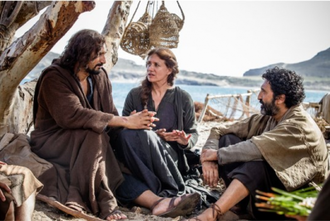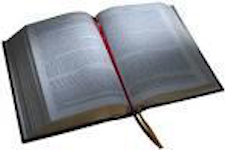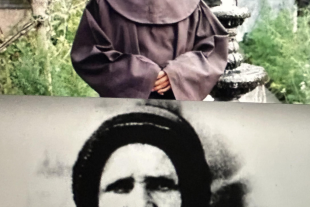Petition asks for lectionary translation in inclusive language

Image: From Risen (2017), dir. Kevin Reynolds
Source: SLN
The Core Group of the Scottish Laity Network write: It is not commonly known that the Scottish Bishops have decided to adopt a new translation for Bible texts that are read at Mass. It is of great concern that this translation continues to use gender-exclusive language when the equal partnership of women and men is fundamental to our society and to the credibility of the Church today. A petition set up by the Scottish Laity Network is asking for a Bible translation in inclusive language.
Those who keep abreast with specialist Catholic news outlets may be aware that both the Bishops of England & Wales and the Bishops' Conference of Scotland have chosen the English Standard Version - Catholic Edition (ESV-CE) for the lectionary to be used at Mass in the future. The vast majority of laity in our parishes, however, are quite oblivious of this decision that will impact an entire generation.
In the aftermath of the Second Vatican Council, the three Bishops' Conferences of Ireland, Scotland and England & Wales approved the Jerusalem Bible (JB) as the basis for the revised three-year lectionary of the Roman Rite of Mass. This translation has been in use for some 50 years so we can expect, at Mass, to be listening to any new lectionary translation for decades to come. Scholars have voiced concerns about the lack of consultation, the provenance of the ESV-CE, and its lack of gender inclusivity. The far-reaching consequences therefore raise questions about its pastoral suitability for the mission of the Church in 21st century Scotland, England & Wales and Ireland.
In our petition, the Scottish Laity Network express concern that the ESV-CE continues to use gender-exclusive language, opting for 'he', 'man', 'brother' etc even when the context includes both male and female, and an inclusive translation is easily possible.
The Bible was written and revised over centuries when patriarchy was the norm and such language was not seen to be exclusive. Our cultural climate is markedly different, however. We now expect both men and women to enjoy the same human rights. In the 21st century, young women and men in these Isles see themselves as equal partners in the home, in school, in the workplace, and in the eyes of God.
They expect no less in their Church. The perception of language has shifted significantly, even over the last 55 years since the JB was published. What was formerly a generic use of 'men' and 'brothers' is now considered outdated and is no longer understood by younger people to include women as well. It is now felt to be exclusive and is preventing women from recognising themselves as being addressed in Scripture.
Much is at stake. Women are already leaving the institutional Church, feeling disenfranchised, and they have the support of their male partners and brothers. Gender-exclusive language is likely to accelerate that exodus. The Church is already in decline, and losing young people as the first teachers of faith of future generations will exacerbate the situation.
A translation which will be alienating for many, both inside and outside the Church not only has serious pastoral implications. Exclusive language is also likely to have a detrimental impact on the Church's credibility. To neglect to make the Word of God accessible in a cultural context of gender equality is to risk becoming irrelevant. In doing so, we are compromising the Church's mission to dialogue with and bring the Good News to our wider secular society.
Alternative inclusive translations for Catholic use do exist. The Canadian Episcopal Conference, for example, adopted the New Revised Standard Version-CE (1985) in 2008. Our petition asks the Scottish Bishops to approve the most recent Revised New Jerusalem Bible (2018), which has received much praise for its inclusive language and up-to-date scholarship, if necessary alongside the ESV-CE so that a choice may be made. This would by no means be unprecedented, since up until now two translations were approved by the Bishops of both England & Wales and Ireland, the JB (most commonly used) and the Revised Standard Version-CE.
A similar earlier English petition addressed to Cardinal Nichols closed at 875 signatures. To date, the Scottish petition has gathered 892 signatures, including English & Welsh, Irish and international support. This might serve as a litmus test that there is indeed wide-spread concern about gender-exclusivity, well beyond the boundaries of Episcopal Conferences. The Irish Bishops, with whom the Association of Catholic Priests have raised the same concerns, are yet to make a decision. It will be interesting to see which road they will take.
The petition is available here: www.change.org/Inclusive-language-bible-texts-at-Mass
The Scottish Laity Network is an organisation that, through dialogue, discernment and support, aims to provide a forum for laity seeking new ways of being Church in Scotland in the 21st century.
Email: slaitynetwork@gmail.com


















